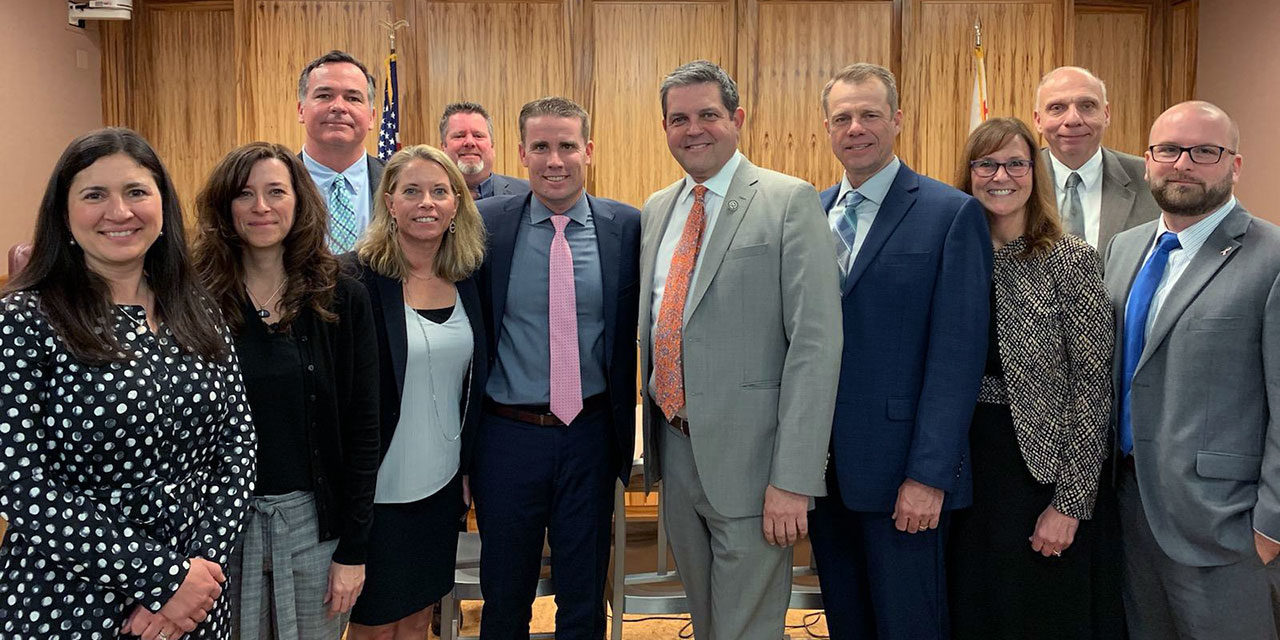Left to right: Melanie Nannizzi, Jacoby Creek; Shari Lovett, Northern United –Humboldt Charter; Michael Quinlan, Garfield; Mindy Fattig, Humboldt-Del Norte SELPA; Don Boyd, Southern Humboldt; Senator Mike McGuire: Assemblymember Jim Wood: Superintendent of Schools, Dr. Chris Hartley; Jan Schmidt, McKinleyville; Tim Parisi, Jacoby Creek; Gary Storts, South Bay
On Monday, March 18, Humboldt County Superintendents arrived on Capitol Hill to participate in the second annual Humboldt County Schools Legislative Advocacy Day, to discuss opportunities and share priorities for students and families in Humboldt County with legislators and key education staff in Sacramento.
Eight district superintendents and leaders from across Humboldt County joined Dr. Chris Hartley, Superintendent of Humboldt County Schools. Those in attendance were Melanie Nannizzi, Jacoby Creek; Shari Lovett, Northern United –Humboldt Charter; Jan Schmidt, McKinleyville; Gary Storts, South Bay; Michael Quinlan, Garfield; Don Boyd, Southern Humboldt; Tim Parisi, Jacoby Creek; and Mindy Fattig from the Humboldt-Del Norte Special Education Local Plan Area (SELPA) also joined the group.
The superintendents were able to have meaningful and relevant conversations with several key decision makers throughout the day including: Senator Mike McGuire; Assemblymember Jim Wood; Tanya Lieberman and Debbie Look from the Assembly Education Committee; Jennifer Johnson, Deputy Legislative Secretary for Governor Newsom; Jeff Bell, Program Manager for Education in the Department of Finance; and representatives from Assemblymember Marc Berman’s office, Ellen Hou Green and Arielle Ayala.
The school district superintendents discussed many topics representing areas of concern and advocacy relative to being in a rural community and operating within very small rural school districts. A major topic and priority was supporting pending legislation AB 428, which would help equalize special education funding throughout the state.
The Humboldt-Del Norte SELPA has a significant percentage of students in special education programs; however, it is the 7th-lowest funded SELPA in California. Hartley shares, “the inequity of special education funding is a critical concern and example of our need to advocate for a funding model that truly follows the students who need the services. The SELPA rates have not been adjusted since the late 70’s and no longer reflect the needs of most importantly, our students, but also schools and districts striving to fund these important programs and services.”
“It’s very important for our state representatives to understand the unique aspects of living in a rural community and be familiar with our needs,” stated Garfield Superintendent Michael Quinlan. “The inequity in special education is a real concern. Without the nearly 60% encroachment on districts’ general funds, we would have the opportunity to better serve all our students.”
At a recent meeting with the majority of district superintendents from Humboldt County present, a platform of critical topics was developed, which served as the foundation for the delegation of folks attending the Legislative Advocacy Day.
“Our team of advocates focused on issues that truly impact student learning and are relevant for all districts and schools in our county,” added Hartley. “Key topics included the need for proactive mental health supports, interagency partnerships, allowing for enhanced Medi-Cal billing in schools, and supporting Career and Technical Education.”
The is the second Legislative Advocacy event organized by the Humboldt County Office of Education, Superintendent Hartley and Capital Advisor Group and will most likely remain as an annual opportunity. Hartley shares, “I’m thankful our local leaders are willing to share their time and energy on behalf of all the schools and districts in our county.”
Melanie Nannizzi, superintendent of Jacoby Creek felt the trip was a valuable opportunity to sit down and discuss these important topics with state legislators and key committee members in addressing some of the significant challenges facing our rural districts. “It feels good to know that the policy makers in Sacramento were able to hear about the successes, challenges, and needs of Humboldt County in person. Taking part in a Legislative Action Day is a wonderful opportunity to advocate for the needs of Humboldt County students, teachers, and schools.”
Quinlan agrees, “Recent efforts by HCOE to support advocacy has definitely had an impact and speaking with our representatives in person is a huge change. Now they are familiar with us and by creating these relationships, we are better able to support them as well.”

